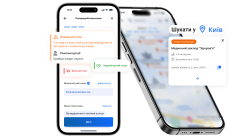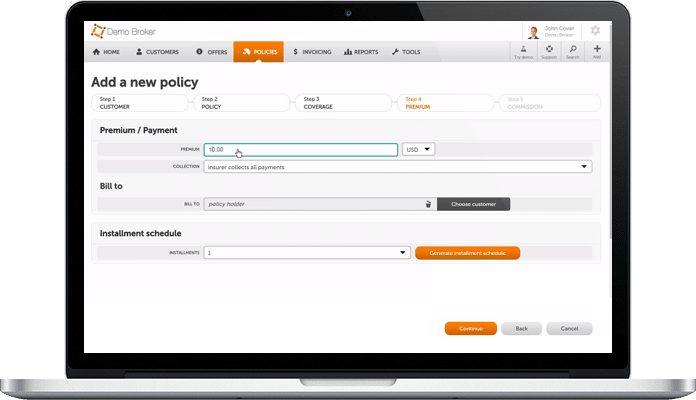Insurance risk management software helps carriers efficiently evaluate and classify the probability and potential financial impact of customer-related risks, enabling appropriate arrangements from the insurer. DICEUS offers the development of tailored software in compliance with your risk strategies and frameworks.
Benefits of bespoke risk management software for insurance companies
Tailor-made IT products for carriers can significantly improve risk performance by implementing advanced analytics, customization, automation, and integration capabilities. As a result, the risk management framework works more efficiently and is better adapted to the insurance organization’s needs.
Possibility to analyze large volumes of data in real time and use predictive modeling to assess the likelihood of various events.
Opportunity to reduce manual errors by automating tasks in underwriting, claims processing, and policy management.
Integration with external data sources (economic indicators, weather data, industry reports, etc.) to help carriers be always up to date on factors influencing their risk landscape.
Improved cybersecurity measures ensure that customer data is protected, which also reduces various breaches and other related risks.
Insurance risk management software development services
DICEUS has over 15 years of experience building bespoke systems for leading carriers, including WTW, BenefitNet, BriteCore, and UNIQA. We will be happy to help you bring your project ideas to life and achieve your business objectives.
risk management process
Want to discuss your project?
Book a call with our experts.
Benefits of our risk management software development services
Some facts about DICEUS
Our insurance risk management software development process
DICEUS is a custom insurance risk management software company that follows an Agile approach to engineering and project management. It allows us to deliver IT solutions effectively and cost-efficiently. Below is our standard SDLC. We recommend starting a project with a discovery phase, as it allows all project stakeholders to gain a clear understanding of the project’s goals and scope, develop a roadmap, identify potential risks, and optimize costs.
Our ready-made software for insurance
Our software products are built with a deep understanding of the insurance industry’s challenges and needs. Our team continually enhances its ready-made software suite to provide insurers and brokers with unique functionalities that automate their processes, improve customer engagement, and reduce operational costs.
- Super App that supports various insurance business lines
- AI-powered underwriting platform
- Core insurance modules
- Group and individual insurance management platform
- Customer web portal
- AI-based chatbot
Book a demo of our ready-made software products for insurance
What impacts your project duration
Before you start a project, you can never define the precise time it will take. However, a ballpark estimation is possible if we have the following information.
- Project requirements
- Time-to-market
- Team composition
- Chosen technology stack
- Integration needs
What affects your project costs
The project budget usually depends on the factors listed below. We highly recommend starting any project with a discovery phase to accurately define the project scope.
- Scope of work and project’s complexity
- The number of upgrades and customizations
- Project completion urgency
- Engagement model: Time and Material, Dedicated Team
What we need from your side
Please provide the information requested below to help us accurately define your project scope.
- Project goals, vision, and roadmap
- Project requirements
- Project-specific documentation
- Your availability for project discussion sessions
Our tech stack
Programming languages















Web frameworks











Other frameworks










Databases













Platforms












Client reviews
Explore our case studies
You might be interested in the following options
Frequently asked questions
How does technology help manage risks in insurance?
The insurance industry faces numerous operational, reputational, and compliance risks that threaten the functioning of any insurance company. In addition to the conventional risks caused by inadequate professional services or adverse environmental conditions, the digital age introduces IT-related threats, such as data breaches and other forms of cybercrime. Given the gamut and complexity of such dangers (especially those driven by high technology), it is impossible to address all the challenges without relying on the state-of-the-art means that the contemporary IT industry has to offer.
What software solutions are popular for risk management?
To effectively mitigate risks and eliminate them, risk management software must possess predictive capabilities, comprehensive reporting and analytics functionality, a user-friendly interface, incident navigation, and extensive integration options. Many existing off-the-shelf solutions, such as TimeCamp, Qualys, MasterControl Risk Analysis, Resolver, nTask, Audits.io, and Reciprocity, among others, meet these requirements. However, only bespoke software built with regard to your unique needs and specific requirements can give you full value.
What is a risk management system in insurance?
In the insurance industry, risk management presupposes assessing the likelihood and financial consequences of events that may happen to the customer. The system responsible for this task must identify the premium cover and the value of insurance risk through leveraging statistical and mathematical modeling. Its other priority lies in helping clients detect risk events to prevent them in a timely manner, as well as reinforcing feedback techniques to enhance the performance and profitability of the underwriting process.
Can DICEUS integrate new risk management software with our legacy systems?
DICEUS offers comprehensive system integration services, ensuring that new risk management software solutions work seamlessly with your existing IT infrastructure, including legacy platforms, third-party APIs, and external data sources.
What modules can be included in risk management software for insurance companies?
Modules may include risk identification, underwriting analytics, claims fraud detection, policy risk scoring, compliance auditing, incident reporting, regulatory alerts, and integration with CRM or ERP platforms. The functionality is fully customizable based on client needs.
How does custom risk management software improve underwriting accuracy?
Custom-built risk management software enables insurers to leverage tailored algorithms, data models, and automation to assess customer profiles with greater precision. It helps reduce human error, increases consistency in decision-making, and speeds up the underwriting process while maintaining regulatory compliance.
How long does it take to develop custom risk management software for the insurance industry?
The development timeline depends on the project’s complexity, required features, integration needs, and the system’s scale. On average, a custom solution may take anywhere from 3 to 9 months from discovery to deployment, including design, development, testing, and integration.
Is it possible to scale the software as our business grows?
Custom insurance risk management systems are designed with scalability in mind, enabling the addition of new users, data sources, and modules, or even transitioning to cloud-native infrastructure as business needs evolve.






















